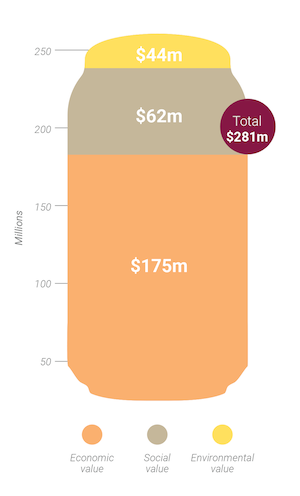



Client
Container Exchange
Queensland
Key Services
Outcomes framework | Social Return on Investment (SROI) | Social Valuation | ESG / Sustainability reporting | Data visualisation
In 2018, Container Exchange was appointed as the organisation responsible for operating Queensland’s new Containers for Change Scheme. The scheme was developed to:
The Containers for Change Scheme collected and refunded over 1.9 billion beverage containers in the 2021–2022 financial year.
Think Impact was engaged to measure the social, economic and environmental value they created through this investment in increasing the circularity of beverage containers.
Think Impact identified six material stakeholder groups who benefit from the Scheme.
We also identified material impacts relating to changes in consumer attitudes, changes in producer attitudes, increased quality of recyclable material and contributions to the future circular economy.
We developed an outcomes framework that is now supporting Container Exchange to measure outcomes across all of these stakeholders.
We then analysed the value being created for each of these stakeholders across economic, social and environmental domains through a Social Return on Investment methodology.
Container Exchange’s decision to pursue Social Return on Investment methodology represented the highest level of transparency in reporting against outcomes for stakeholders compared to other container deposit schemes nationally.
Overall, the analysis identified that $281 million of value was created through the Containers for Change Scheme in the 2021–22 financial year. The majority of this – $175 million – was economic value, with a further $62 million of social value and $44 million of environmental value created.

This work supported Container Exchange to report transparently to communities and government stakeholders about the overall benefits of increased investment in the circular economy and increased recycling.
Lightbox content